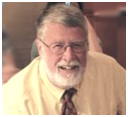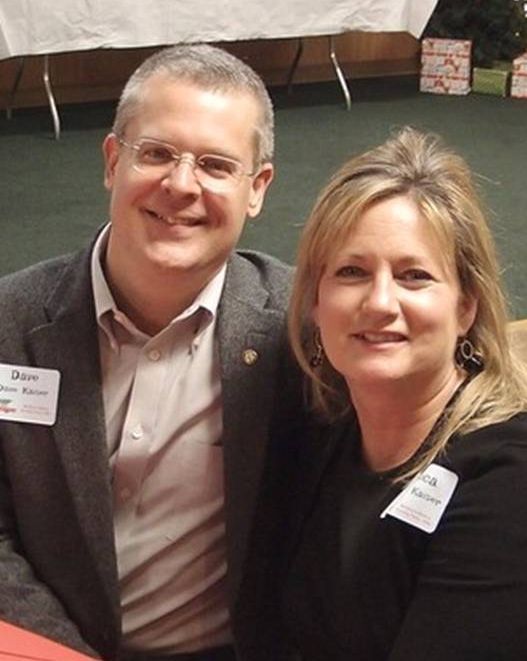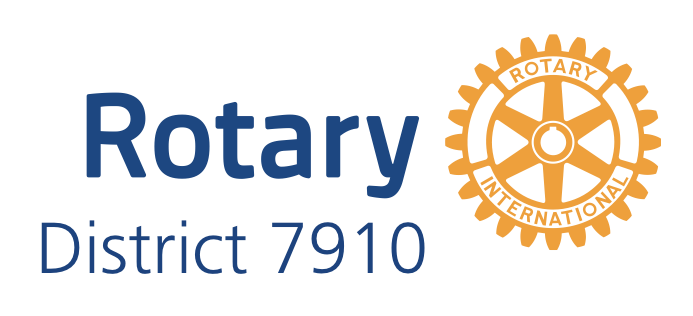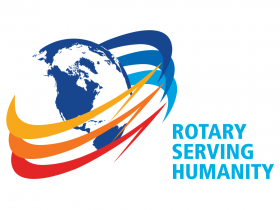Rotarian Essay - Ron Goodenow - April 18, 2017
Personal Responsibility: a Core Value for Rotarians - and Others We Touch
By Ron Goodenow

Think about the "reach" of Rotary to improve lives. We have programs that, as in our NICVIEW program at UMass Memorial Health Care, helps babies (and their parents) in their neo-natal state. As noted in one of my recent essays, we are in a unique position to help people get through later life loneliness and anguish.
When I met up with Dave Kaiser (shown, on left) incoming chair of our district's incoming Rotary Leadership Institute Committee past president of Westborough Rotary, and his wife and fellow Westborough Rotarian, Jessica Kaiser (shown, on right), at the wonderful Northborough Rotary pancake breakfast a couple of weeks ago, we discussed my argument in one of those essays that Rotary needs to apply some "social psychology" to membership issues,. Dave, who did not disagree, suggested we also need to spend far more time on the dynamics and meaning of personal responsibility, what he deemed to be “the most important value for a healthy society” and a bedrock to social behavior.
past president of Westborough Rotary, and his wife and fellow Westborough Rotarian, Jessica Kaiser (shown, on right), at the wonderful Northborough Rotary pancake breakfast a couple of weeks ago, we discussed my argument in one of those essays that Rotary needs to apply some "social psychology" to membership issues,. Dave, who did not disagree, suggested we also need to spend far more time on the dynamics and meaning of personal responsibility, what he deemed to be “the most important value for a healthy society” and a bedrock to social behavior.
 past president of Westborough Rotary, and his wife and fellow Westborough Rotarian, Jessica Kaiser (shown, on right), at the wonderful Northborough Rotary pancake breakfast a couple of weeks ago, we discussed my argument in one of those essays that Rotary needs to apply some "social psychology" to membership issues,. Dave, who did not disagree, suggested we also need to spend far more time on the dynamics and meaning of personal responsibility, what he deemed to be “the most important value for a healthy society” and a bedrock to social behavior.
past president of Westborough Rotary, and his wife and fellow Westborough Rotarian, Jessica Kaiser (shown, on right), at the wonderful Northborough Rotary pancake breakfast a couple of weeks ago, we discussed my argument in one of those essays that Rotary needs to apply some "social psychology" to membership issues,. Dave, who did not disagree, suggested we also need to spend far more time on the dynamics and meaning of personal responsibility, what he deemed to be “the most important value for a healthy society” and a bedrock to social behavior.The three of us had a great talk about that subject. And so, greedy editor that I am, I asked Dave to send me some main points, which he did, providing real balance to a term that is often perceived as being owned by "conservatives:"
"Personal responsibility (PR)," Dave writes, “means you take ownership for everything you do or say. Children need to learn the core values that build character from the day they are born. It starts with what parents do and say themselves. Schools and society must also support the concept, and PR is a key component.”
Just what should people do? The PR approach to conflict is to stop and ask yourself, “What did I do or not do that contributed to this situation? What could I have done differently?” This allows you to see the other person’s perspective more readily, and leads to a faster and fairer resolution.
As Dave looks at broad societal trends, he sees PR pushed aside by a rush to political correctness and a tendency to get overly caught up in group, ethnicity and other forms of identity, as well as thoughts that one is "owed’" something. "As people adopt this selfish outlook on life, they move away from PR as a value," he writes. "Is it any wonder there is so much conflict in the world?"
The Eagles’ song, “Get Over It,” gets my vote as the PR movement’s anthem. I’ve never found anyone who has heard it who hasn’t said, “Yah, I agree with that.” More people need to hear and understand these lyrics.
One of the very interesting and welcome aspects of Dave’s comments is his willingness to dig deep and share insights into his youth. That includes the struggles of his family, which helped shape his PR view - and success..
As a child I was the youngest of five children being raised by a divorced mother who was forced back into the workforce with only a high school diploma, and who had not worked in over 15 years.Her only work experience was a couple of years as a secretary. At one point, she worked at least three jobs. We were on public assistance for some time. I remember my mom using food stamps at the grocery store, and me not having to pay for hot lunch at school. I was so embarrassed when my friends asked why I never gave the lunch lady money, and that I told them that we had paid in advance.
While no one should feel ashamed to need help, it is worse to not feel some sense of shame. A lack of shame leads to a sense of entitlement.This sense of shame has helped me to mature and work hard to achieve what I have in my life. I cannot understand how others in a similar situation lose their sense of shame, and act cavalier about taking a handout.
Dave concludes with the three types of people you may find in a disaster:
1. Those who selflessly help others.
2. Those who selfishly take from others.
3. Those who cannot either help others or care for themselves.
The reason airline-security talks emphasize getting your oxygen mask on first before helping others is so you don't become part of the problem. In PR terms, when we take responsibility for ourselves, we are less of a drain on resources that should go to those truly in need.
Too many "needy" people are actually greedy. They find it easier to take from others than doing for themselves. This ultimately drains resources that could help those who cannot fend for themselves. In my opinion, when society holds us all accountable to PR as a value, this problem is lessened
There are surely many ways Rotary can contribute to helping members, affiliate youth and other groups, and organizational efforts such as RYLA and the RLI - which Dave will be heading for District 7910 - understand the meaning and applications of personal responsibiilty.
We all know that as a matter of "social responsibility’" Rotary must deal with a wide range of issues, but Dave also reminds us that bedrock messaging around being personally responsible for whatever one does is a fabulous foundation for seeing the world, thinking of one’s own personal and family situation, and defining the sorts of things we would like to expect not only of our organizations but also of politicians in a time of considerable political debate, controversy and anger. In addition to either building that bridge or fighting that bad guy is being truly personally responsible.
This is a concept that fits perfectly Rotary's Four-Way Test perfectly. Once one has established that principle in one’s life, one can address broader issues of public need and policy.
Thanks Dave and Jessica.
I welcome others to come forward with ideas.
Ron Goodenow, a member of the Rotary Club of Westborough, may be reached at ron.goodenow@gmail.com.


